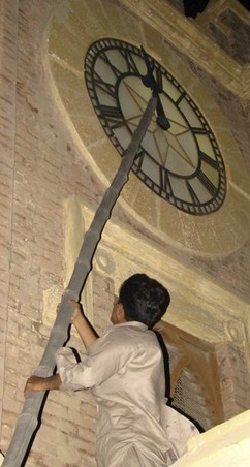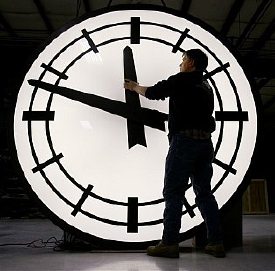Adil Najam
 As of the stroke of midnight Saturday-Sunday (May 31-June 1, 2008) Pakistan officially advanced its clocks by one hour. This “daylight savings” move is a bid to conserve energy in an increasingly energy strapped economy in conditions where everyone agrees that the energy situation is going to get worse well before it gets any better.
As of the stroke of midnight Saturday-Sunday (May 31-June 1, 2008) Pakistan officially advanced its clocks by one hour. This “daylight savings” move is a bid to conserve energy in an increasingly energy strapped economy in conditions where everyone agrees that the energy situation is going to get worse well before it gets any better.
The change puts Pakistan six hours ahead of the GMT. This change will last for three months; June-August.
Dawn reports that:
the energy conservation package approved by the Federal Cabinet on May 14 also envisages that during the next three months (June-August), all shopping plazas will close business after 9 p.m. and switch over their weekly holidays from Sunday to Friday, while industries will similarly stagger their weekly offs; WAPDA will not supply power to billboards using lights besides management of street lights. Under Cabinet’s directive the use of air conditioners will be stopped from 8 a.m. to 11 a.m. in Prime Minister House, Secretariat and other government offices, while one million energy saver bulbs will be purchased to promote culture of installing such bulbs across the country. The government has already set up a task force to control line losses.
The energy situation in Pakistan is precarious indeed. The economic loss that is being caused by it has to be immense. In all major cities, one seems to spend the entire day waiting for or recovering from the last load-shedding. Indeed, the economic working day in Pakistan is better described as the few hours of electricity in an otherwise electricity-less day, rather than by the hours of load-shedding within a “normal” flow of electricity.
The economic loss has to be measured not only by the economic value that is lost because of the lack of electricity, but also but the resources that are being diverted towards the expenditures necessitated by the new “load-shedding economy.” Those who can afford to, and many who can not, are being forced to spend obnoxious amounts of ineffective, uneconomical, noisy and polluting generators. Those who cannot, try out UPS solutions and the markets are flooded by over-priced and under-performing Chinese “rechargeable” lights and fans (some with built-in radios and other gimmicks). Most, however, have no options but to get used to the new status quo where people are already beginning to describe th day not by how many hours of load-shedding they have but by how many hours of electricity they get!
So, is “daylight savings” the answer? Or, at least, part of the answer?
 The history and reality of the idea of daylight savings is itself a fascinating one. The book, Spring Forward: The Annual Madness of Daylight Saving Time by Michael Downing, is a most fascinating account of the history and efficacy of the idea and it is not clear just how useful – if at all – the concept has been in actually saving energy.
The history and reality of the idea of daylight savings is itself a fascinating one. The book, Spring Forward: The Annual Madness of Daylight Saving Time by Michael Downing, is a most fascinating account of the history and efficacy of the idea and it is not clear just how useful – if at all – the concept has been in actually saving energy.
To look on the bright side, the decision shows that a certain seriousness has emerged in Pakistan to think seriously about conservation solutions. Everyone seems honestly interested in it. And, quite clearly, conservation has to be a key step. However, this along with the other steps in the new Energy Conservation Plan, even if appropriate, seem like an inadequate attempt to respond to a crisis that demands much more bold strategies.
A simple chronicle of just some of the many posts ATP has carried on the topic shows just how serious a crisis we are in and how much worse it is likely to become:
The Violence of Energy Insecurity
KESC, Karachi and Power Outages
Multiple Crises in Pakistan
Karachi Suffering the Heat
Bijli Bachao Mohem!
Andhair Nagri
Bijli Nama



















































Daylight Savings Time is only of any use in high-latitude countries. Tropical and near-tropical areas benefit very little from it, if at all. In any case, the use of light-bulbs alone is not the contributor … in the heat of these 3 months fans, air-coolers, air-conditioners, all add to the increased demand for electricity.
The confusion caused by this move for Airline TimeTables is hilarious. Last night at a literary event the most educated of people were wondering if the 4pm flight now takes off at the new 5pm or the old 3pm. Another wondered if this would have an effect on international connecting flights. An author of several books was unsure what time she has now to receive her sister at the airport tomorrrow (“So, will she arrive early or late?”, she asked :-D Now think of Train Times which are of more use to the poorer and less literate masses and the confusion that’ll cause if even our literati can’t figure this out.
Several at the event said that a 3-month period was just not worth it, but one MPA pointed out that it was specifically chosen, after much deliberation, to coincide with school holidays.
As far as energy conservation goes, we do waste a lot. But that being said, I also want somebody to initiate an inquiry as to how in the world we got to a situation from no load shedding to no work in less than a year. I smell lots of stinking fish here.
Energy ka tou pataa nahiN..but I support the decision of advancing clocks for its social implications. It will hopefully make people start their daily business an hour early. The current trend in Pak has been that major markets in cities don’t open until 11 a.m. to noon. A decade ago they used to start business b/w 10-11 a.m. and may be earlier in previous generation. Eventhough time-wise the businesses will still open b/w 11 a.m. -noon but in day-light wise they may become ‘sehr-khez’ by an hour and may get an extra hour of day light in the evening to spend with the family.
The cynical response would be that nothing ever happens in Pakistan on time anyhow, so this will make no difference.
But more seriously, I think it will be difficult to implement amongst ordinary Pakisatnis and only in large companies and government offices in urban centers will it make a difference and that will be overall very very small.
are you sure this is true?
And what is now new time difference between US East Coast and Pakistan?